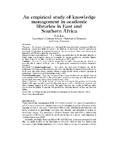Please use this identifier to cite or link to this item:
http://hdl.handle.net/10311/874| Title: | An empirical study of knowledge management in academic libraries in East and Southern Africa |
| Authors: | Jain, P. |
| Keywords: | Knowledge management Information management Academic libraries Africa |
| Issue Date: | 2007 |
| Publisher: | Emerald/www.emeraldinsight.com |
| Citation: | Jain, P. (2007) An empirical study of knowledge management in academic libraries in East and Southern Africa, Library Review, Vol. 56, No. 5, pp. 377-392 |
| Abstract: | The purpose of this paper is to distinguish between information management (IM) and knowledge management (KM) and present the findings of small-scale research conducted to investigate KM practices in academic libraries in East and Southern Africa, and discussing the importance of KM and suggest the way forward. Design/methodology/approach – This research was undertaken in 20 university libraries in Africa using a questionnaire survey to investigate the current practices in university libraries in Africa to discover whether these libraries are practising KM or IM. Findings – This survey results seem to suggest that currently most participating libraries are practising IM. A majority of 65 per cent of the participants considered themselves information managers. Research limitations/ implications – This survey have had some limitations: one, all the participants were University librarians; two, due to the unavailability of contact addresses, the survey could cover only eight African countries. Future research should include a broader spectrum of participants to have an in-depth knowledge related to KM. Practical implications – This paper has practical implications for those who are not fully aware of the importance of KM, how KM can be used to gain a competitive advantage; to break financial and technological constraints; and to satisfy escalating user needs. Originality/value – Not much has been done in Africa to explore KM practices in University libraries, this paper contributes towards filling that gap and adds to KM literature in general and offers empirical support to KM concept. This paper discusses the benefits of KM and offers several recommendations to facilitate KM practices in university libraries in East and Southern Africa. |
| URI: | http://hdl.handle.net/10311/874 |
| ISSN: | 0024-2535 |
| Appears in Collections: | Research articles (Dept of Library and Information Studies) |
Files in This Item:
| File | Description | Size | Format | |
|---|---|---|---|---|
| Jain_LR_2007.pdf | 1.38 MB | Adobe PDF |  View/Open |
Items in DSpace are protected by copyright, with all rights reserved, unless otherwise indicated.
